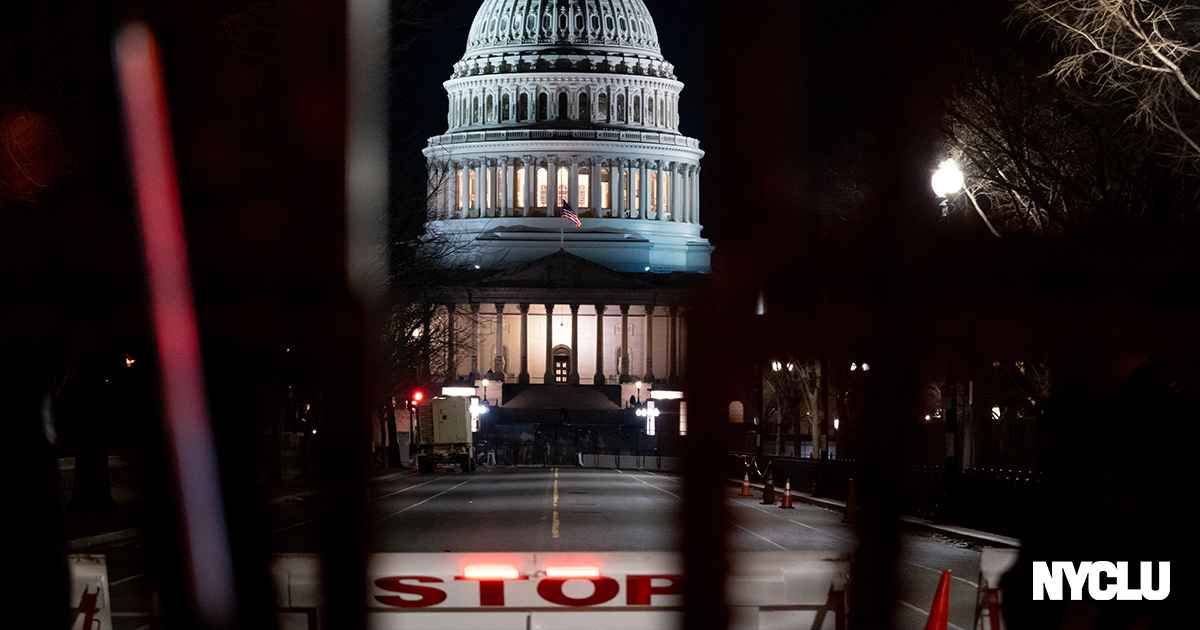Over the past few months, 42 activists have been charged with “domestic terrorism” under Georgia state law. Their acts of “terrorism”? Alleged property damage and trespassing while protesting. These prosecutions exemplify a highly problematic trend of the government — both state and federal — using domestic terrorism powers to punish dissent.
In Georgia, the arrested activists are part of a movement seeking to stop the construction of a $90 million police training facility located in a forest in Southeast Atlanta. Since late 2021, protesters under the banners of “Stop Cop City” and “Protect the Weelaunee Forest” have raised concerns over climate justice, displacement of Black communities, and increasing militarization of police forces. Protesters have camped out in the forest, staged marches, and hosted community events. At times, a small minority of protesters have damaged property.
Georgia police have responded with overwhelming and disproportionate force. Police killed one protester in January. They have arrested dozens more, including a legal observer associated with the Southern Poverty Law Center and the National Lawyers Guild. And prosecutors have levied severe charges under Georgia’s rarely-used domestic terrorism statute.
Until 2017, Georgia’s domestic terrorism statute criminalized acts intended to or reasonably likely to kill or injure at least 10 people. In the wake of the massacre of nine Black parishioners by a white supremacist gunman in Charleston, South Carolina, the Georgia legislature amended the statute by vastly expanding its reach. The new law broadened the state’s definition of “domestic terrorism” to include certain property crimes committed with the intent to “alter, change, or coerce the policy of the government” by “intimidation or coercion.”
The amendment added a stigmatizing label and a harsher punishment — up to 35 years in prison — to property crimes that were already illegal, simply because of accompanying political expression critical of government policy. At the time of the amendment’s passing, the ACLU of Georgia and other civil rights groups objected that the statute could be weaponized to suppress protected First Amendment activity. These concerns are now a reality for “Cop City” activists.
The recent arrests demonstrate how overbroad laws like Georgia’s can be wielded to disproportionately punish people who express political beliefs. The “Stop Cop City” defendants are not accused of injuring, or even attempting to injure, anyone at all. At most, they are accused of damaging property, and some defendants appear to be accused of no more than misdemeanor trespass. But the state has chosen to press extreme charges of “domestic terrorism” because the defendants were also engaged in a political protest that challenges the increasing militarization of the police.
Prosecutors’ rush to slap “domestic terrorism” charges on protesters also threatens to chill the legitimate exercise of First Amendment rights by the protestors’ allies and others. Sometimes, during an otherwise peaceful political protest, a small group of individuals might throw objects or engage in vandalism. Law-abiding protesters in the vicinity risk being mistakenly (or carelessly) accused of participating in those actions — and being charged not just with a minor property crime, but with terrorism and a potential 35-year prison sentence. The danger of facing such severe charges can force protesters to make a difficult choice: surrender their cause or risk being labeled and locked up as a “terrorist.”
The events in Atlanta reflect a disturbing nationwide trend to respond to the very real problem of rising white nationalist violence with broad “counter-terrorism” measures that can stifle dissent. On the heels of the January 6 riots at the Capitol, President Biden announced an unprecedented nationwide strategy to combat domestic terrorism. The strategy left open the possibility of a new federal domestic terrorism statute, despite the dozens of existing laws that already criminalize hate-motivated and other violent acts. It did nothing to rein in national security policies that target Black and Brown communities and people engaged in dissent for unjustified surveillance, investigation, and prosecution.
As states have increasingly passed “domestic terrorism” laws, the result is that a range of at times wholly innocent or constitutionally protected activity is penalized and stigmatized with a politically-charged label. Domestic terrorism laws — whether at the state or federal level — are not only unnecessary but dangerous. Prosecutors in Georgia should drop the domestic terrorism charges against the “Cop City” activists and stop using the statute to punish and chill legitimate political protest.
Published March 24, 2023 at 08:08PM
via ACLU https://ift.tt/pq0VEu9

No comments:
Post a Comment